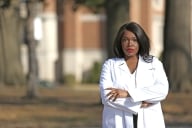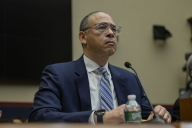You have /5 articles left.
Sign up for a free account or log in.
MINNEAPOLIS -- Raise your hand if you or one of your colleagues has expressed the view in the last year or two that "this generation of college and university students, and many of their professors, don’t understand freedom of speech"? (Yes, mine is up.)
Rodney A. Smolla, dean of Widener University's Delaware Law School, offered his fellow attendees at the annual meeting of the National Association of College and University Attorneys here a helpful reminder that the history and status of American law on free speech isn't nearly as "simplistic" as is often portrayed.
The topic of campus speech has flared at many colleges and universities, and it is among the most talked-about issues at this conference, formally (in the content of four full sessions) and informally (in hallway conversations and chats over meals).
Smolla, who in addition to being a three-time law dean was president of Furman University and argued a First Amendment case before the Supreme Court, channeled the longtime law professor in him in his presentation at one of those sessions, "Faculty and Employee Expression and Academic Freedom in a Time of Unrest."
Many presentations at a conference like this are filled with minute details about specific court rulings and hypothetical case studies, and the session Smolla participated in was no exception, with panelists exploring real and theoretical (usually pulled from the headlines) situations in which faculty and staff members tested the boundaries of their free speech rights in the classroom, their research and on social media.
Smolla sought to pull back the frame and remind the audience that the last 100 years of American law have reflected a competition between two conflicting interpretations of free speech -- or, as he put it, a "battle between two magnificent, sublime ideas that are in tension with each other."
For much of the 20th century -- until the 1960s, when "the whole country changed," Smolla said -- the dominant legal theory surrounding free speech was what he called the "order and morality" theory. That approach, most famously framed in a World War II-era case involving a Jehovah's Witness and the marshal of a New Hampshire town, cast a highly critical eye on speech that either challenged the keeping of the peace (literal "fighting words") or speech that was readily viewed as immoral (because "by their very utterance [they] inflict injury").
But a series of cases in the 1960s, by embracing Oliver Wendell Holmes's famous dissent in a 1919 case known as Abrams v. United States, set the stage for the theory that has ruled for the last 50 years by urging protection for just about any speech, no matter how loathsome, unless it threatens the country.
The latter approach, in which "the most offensive speech you can imagine gets protected," has held sway for much of the last half century, but "a lot of people on campus" think the former "is the right way to think about free speech," Smolla said.
The sharp bifurcation Smolla laid out has been finessed in recent years, he noted, by embrace of the idea that the setting where speech occurs matters. "In the vast open spaces of our society" -- in the streets, on the internet -- "marketplace theory runs the show," and the courts have strongly protected free speech.
But in certain places, "order and morality trumps the marketplace," Smolla said. Those places include the workplace and public schools, among others.
Where does a campus fall, though?
Many students and their supporters on the faculty, troubled by what they perceive as attacks on students who are members of certain racial or ethnic groups, gay students, or others, believe "the campus should not be the kind of anything-goes, raucous, hate-filled, angry, over-the-top marketplace that exists in the rest of society," Smolla said. "It should be a community of scholars," where "rational discourse" -- order and morality -- rules.
But others believe that "if there’s ever a place where the marketplace should rule" -- in late-night arguments in dorms, faculty meetings and the like -- it should be the college campus. "Let it all hang out," this theory goes.
Smolla did not offer an opinion (directly) on which theory of free speech he thought should hold sway, although he suggested that "some sort of amalgam of marketplace theory and non-marketplace theory" is probably appropriate.
His main point, though, was that it's "not that this generation doesn’t get [free speech], they just buy into one particular version of it."









